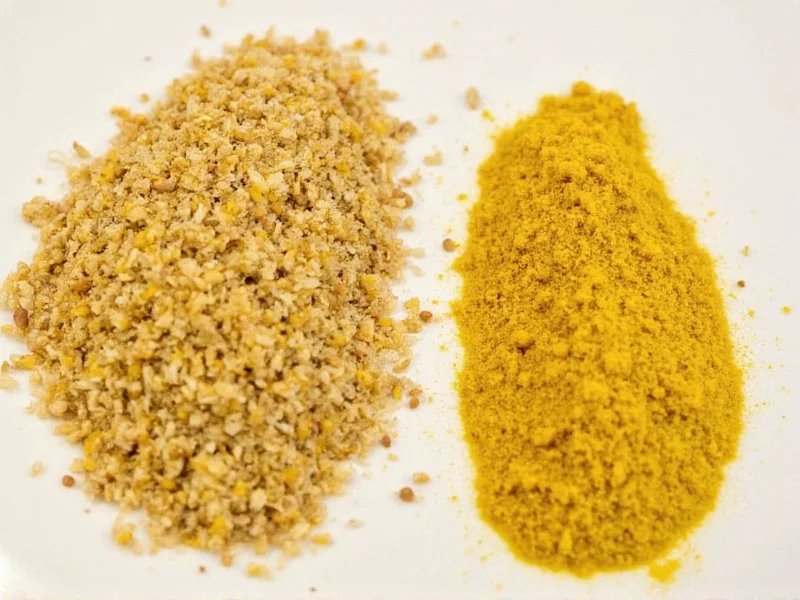Ground mustard, made from finely milled mustard seeds, adds distinctive tang and depth to recipes from salad dressings to meat rubs. When you're mid-recipe and realize you're out of this pantry staple, knowing effective substitutions prevents cooking disasters. This guide provides practical alternatives that maintain your dish's intended flavor profile while working with common kitchen ingredients.
Understanding Ground Mustard's Role in Cooking
Ground mustard isn't just about heat—it contributes complex flavor notes including earthiness, slight bitterness, and tanginess that enhance both savory and some sweet applications. Unlike prepared mustard, which contains vinegar and water, ground mustard powder activates when mixed with liquid, releasing enzymes that create its signature pungency. This chemical reaction means substitution requires careful consideration of both flavor and functionality in your specific recipe.
Top 5 Substitutes for Ground Mustard
1. Prepared Yellow Mustard (Best for Dressings and Wet Applications)
Use a 1:1 ratio when replacing ground mustard with prepared yellow mustard in salad dressings, sauces, or wet batters. Since prepared mustard already contains vinegar and water, reduce other liquids in your recipe by 1-2 teaspoons per tablespoon of mustard substituted. This ground mustard alternative works particularly well in substitution for ground mustard in coleslaw recipes where moisture content matters.
2. Freshly Ground Mustard Seeds (Best for Rubs and Dry Mixes)
Grind yellow or brown mustard seeds in a spice grinder or mortar and pestle using a 1.5:1 ratio (1.5 teaspoons seeds for 1 teaspoon ground mustard). The freshly ground seeds provide more intense flavor and slight texture that works perfectly in substitute for ground mustard in meat rubs. Let the ground seeds sit for 10 minutes after grinding to allow enzymes to activate before using.
3. Wasabi Powder (Best for Asian-Inspired Dishes)
Use wasabi powder at half the amount of ground mustard required (1\/2 teaspoon wasabi for 1 teaspoon mustard). While not identical, wasabi provides similar pungency with different flavor notes that complement Asian recipes. This works as an effective substitution for ground mustard in teriyaki marinades where traditional mustard would seem out of place.
4. Turmeric-Vinegar Blend (Best for Color and Mild Flavor)
Combine 1\/2 teaspoon turmeric, 1\/4 teaspoon vinegar, and a pinch of black pepper to replace 1 teaspoon ground mustard. This mixture mimics mustard's color and provides mild tang without strong mustard flavor—ideal for ground mustard substitute in cheese sauce recipes where you want color without overpowering mustard taste.
5. Horseradish (Best for Bold Flavor Profiles)
Use 3\/4 teaspoon prepared horseradish per 1 teaspoon ground mustard. Horseradish delivers similar heat but with different flavor notes, making it perfect for substitute for ground mustard in deviled eggs where you want that sharp kick without traditional mustard flavor.
| Substitute | Ratio (vs 1 tsp ground mustard) | Best Recipe Types | Flavor Difference | Adjustments Needed |
|---|---|---|---|---|
| Prepared yellow mustard | 1 tsp | Dressings, sauces, wet batters | Milder, more vinegar-forward | Reduce other liquids by 1-2 tsp |
| Freshly ground mustard seeds | 1.5 tsp | Rubs, dry mixes, marinades | Stronger, more complex | Let sit 10 minutes before using |
| Wasabi powder | 0.5 tsp | Asian dishes, marinades | Sharper heat, different flavor | Add 1\/4 tsp water if needed |
| Turmeric-vinegar blend | 1\/2 tsp turmeric + 1\/4 tsp vinegar + pinch pepper | Cheese sauces, light-colored dishes | Much milder, primarily for color | None typically needed |
| Prepared horseradish | 3\/4 tsp | Deviled eggs, bold-flavored dishes | Sharper heat, less tangy | Reduce other liquids slightly |
Choosing the Right Substitute for Your Recipe
The perfect ground mustard alternative depends on your specific application. For substitution for ground mustard in mayonnaise-based dressings, prepared yellow mustard provides the closest flavor match with proper moisture balance. When making substitute for ground mustard in barbecue rubs, freshly ground mustard seeds deliver the necessary texture and robust flavor that won't dissolve like powder would.
Dry applications like spice rubs require substitutes that won't introduce extra moisture, while wet applications like dressings can accommodate liquid alternatives. Consider whether you need primarily the flavor, the color, or the functional properties (like emulsification) that mustard provides in your specific recipe.
Common Substitution Mistakes to Avoid
Many home cooks make critical errors when substituting for ground mustard. Using prepared mustard in dry rubs creates clumping and alters texture. Substituting horseradish in delicate cheese sauces overwhelms other flavors. When creating a ground mustard substitute for baking recipes, remember that liquid substitutes require adjusting other wet ingredients to maintain proper batter consistency.
Never substitute straight vinegar for mustard—this provides acidity without the complex flavor profile. Similarly, using mustard oil creates an entirely different flavor experience that doesn't mimic ground mustard's characteristics. For the most accurate substitution for ground mustard in traditional recipes, always consider both flavor and functional properties.
Testing Your Substitute
Before adding your mustard substitute to the entire recipe, test a small portion. Mix your substitute with a spoonful of the base ingredients and taste. This prevents ruining an entire dish, especially important when creating a substitute for ground mustard in expensive ingredient recipes. Adjust quantities based on your taste test—some substitutes require fine-tuning to match the intended flavor profile.

